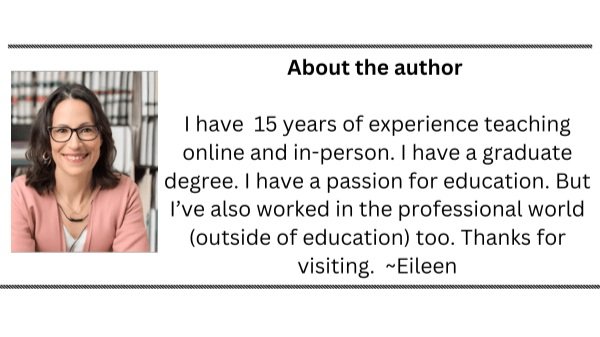10 surprising ways college is different than high school
About the author
Hi there. I am the prolific professor with 15 years of experience teaching online and in-person. I have a graduate degree. I have a passion for education. But I’ve also worked in the professional world (outside of education) too. Thanks for visiting.
This website contains affiliate links and we may earn a commission on any purchases you make from clicking on our links.
How is college different than high school?
Are you wondering how college will be different than your high school experience?
Or has it been a while since you graduated high school and are worried what college will be like?
As a previous college professor, I am going to give you the facts.
I’ll explain exactly how college is different than high school AND help you understand what to expect from college.
Some of these things just might surprise you.
Because high school is not the same thing as college.
What is the difference between high school and college life?
1.) No one forces you to go
That’s right. No one is going to call your parents when you don’t show up for your college class. No letters going home in your backpack with a progress report to notify your parents about your absences or bad grades.
And no buses to come and pick you up at your nearest bus stop.
It’s non-existent in most circumstances.
It will be up to you to get up and get to class without anyone forcing you to go.
If you don’t show up, you risk getting bad grades and missing important lectures.
Don’t expect an email from your professor wondering where you are, and reminding you to show up next time.
They have too many students to do that for everyone. You’ll have to be responsible for yourself.
2.) You’ll have more homework
When you were in high school, you probably had lots of downtime in class to work on projects and complete assignments.
But in college classes, lecture is usually for instruction only. And any work will be completed outside of class.
The professor has you for a very short period of time.
On average, you’ll have around 40 hours of lecture each semester. And your professor needs that time to teach you the information.
Everything else will be done outside of class.
This will result in more time dedicated to coursework outside of class.
With high school assignments and projects, you probably saw the same teacher every day.
They reminded you of upcoming due dates, and you talked to your classmates about projects and assignments.
In college, you may meet once a week, or not at all if you’re online.
So, your success is dependent upon your organization.
Don’t expect a reminder from your professor. They have a lot of classes and can’t send reminders every time something is due.
Get a planner and get ready to organize all your deadlines.
And if you are taking an online class, pay special attention to your deadlines to stay organized.
3.) You pay for your instruction
In most instances, you attended public school for FREE. Okay, sure, people pay taxes that fund most educational systems in the United States, but the reality is that you didn’t have to directly pay a dime for your K-12 education.
In college, you are going to have to pay tuition for your classes.
And when you miss class, you are forfeiting your money because you aren’t getting what you paid for.
So go to class and remember that you are paying to learn from your professors.
I do know that there are some students that may be getting a free college education too, but somewhere down the line, someone is paying for you to be there. So take advantage of your opportunity.
4.) Libraries are online
You were probably used to the Dewey Decimal System and you went to the library and checked out books for projects in high school.
In college, you typically have access to a physical location where books are stored, but you won’t be using those books as often.
Say goodbye to libraries and hello to online journals.
A lot of college classes will require scholarly sources, and most of those come from peer-reviewed journals.
And those subscriptions are online.
Don’t worry though.
You shouldn’t ever have to pay for a subscription. Your college library likely subscribes to plenty for you.
5.) You must buy textbooks
In addition to your tuition, you’ll have to spend additional money buying supplies.
Most courses will require textbooks.
Some colleges will include this amount in your tuition for a reduced rate or professors may use open educational resources (OER) that are free.
But most professors will use traditional textbooks.
So be prepared to set aside some money to pay for your books because they can get expensive.
However, there are plenty of purchasing options like renting or buying an online copy.
And don’t forget about used copies too.
If you can’t afford the books, check with your professor, and see if they can put a copy on reserve for you at the library.
6.) Resources exist
When you were in high school, you had a counselor available, but you really didn’t have much else.
In college, you will probably have plenty of additional resources that are free. Some colleges have health clinics, professional counselors for mental health, writing resources, tutoring, gyms, technical assistance, etc.
The list goes on.
So, make sure you check out what your college has to offer because you don’t want to miss out of getting assistance when you need it the most.
7.) Your parents won’t know what’s going on
For most colleges in the United States, they are bound by federal privacy laws (FERPA). They won’t be sharing information with your parents about your college life unless you signed a waiver, and again, it’s limited. There are some exceptions, but it’s rare.
So, maybe you’ll appreciate the privacy, but your parents might not.
Make sure you know how your college handles your privacy and always read everything you are signing.
You may need a waiver if you want your parents to communicate with your professors or the college.
Otherwise parents are left in the dark. Don’t have your parents send emails to your professors on your behalf, unless it’s an emergency, because the professor will just ask to speak to you personally to protect your privacy,
8.) You’ll have campus wi-fi
The days are long gone where you don’t always have your cellphone on you and accessible.
I know some professors have very strict rules on phone use during class time, but some professors will even have you use it during lecture to do classwork.
You’ll need to follow each professor’s policy, but just know that you’ll likely be using it on campus.
Most colleges have public wi-fi where students can access the internet, and I’ve even seen charging stations throughout the campus.
So, get you a trusty laptop or tablet and get prepared to access the internet.
Just make sure you do it safely and connect with a VPN.
9.) Your professor may not be able to teach
Professors were hired because of their knowledge and expertise in their field, among other things.
It is entirely possible that they never learned how to teach.
Teachers usually get a degree in education, but professors earn a degree in their respective fields instead.
This could mean boring lectures, but amazing talent in the ranks.
This isn’t always the case because as professors get more experience, they usually get better at their craft.
But don’t expect stellar lectures each and every time.
Hunker down, pay attention, and relish in the opportunity to learn from some amazing individuals with experience.
10.) No makeup work
Now, there is a lot of grey area here.
Let me explain.
In high school, you might have been used to getting many opportunities to complete a missed assignment.
You might even have been given a chance to redo the assignment for a better grade.
In college, that probably won’t happen.
If you sleep in, and miss an exam, you’ll get a zero.
If you didn’t study enough and make a bad grade, you’re not going to get another try.
There are some rare instances where you will be given a makeup opportunity, but those are really limited to serious things like illnesses or jury duty.
Otherwise, you’re stuck with the grade you earned.
Now that you’ve read the list of 10 ways college is different than high school, you’ll be better prepared for college. And won’t be so surprised by your college experience after high school.
Even if you are an older college student, things have changed quite a bit and this list will help you get better prepared.
FREQUENTLY ASKED QUESTIONS
How hard is college compared to high school?
College may be harder than high school because the expectations are usually higher than high school. You might have to put more effort into your coursework because the academic rigor may be more challenging. And most professors won’t give you the ability to makeup or re-do assignments, or choose an alternative one so there is less leniency.
What is the difference between college and high school workloads?
In high school, you probably did a lot of your work during class, and you had access to your teachers more often. In college, you will do little work in class and spend more time listening to lectures.
You usually see your professor less often too.
And then all coursework is typically completed outside of class. So, you will need to make sure you give yourself plenty of time to study for courses.
I have an entire article to help explain exactly how much time you should dedicate to studying.
What is the difference between a high school and college essay?
When you completed essays in high school, you probably had little need for outside resources. College essays will require you to complete independent research within scholarly sources. In addition to that, you will need to have citations and references. And learn how to paraphrase.
Also, college essays usually require more critical thinking and independent analysis to make conclusions.
Lastly, you will probably have a grading rubric that will show you the criteria the professor uses to grade.
As a professor, I would tell you that college essays require more academic ability than high school essays.
OTHER POSTS YOU’LL LOVE




